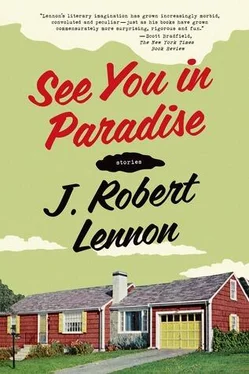God, he thought, shaking off his thing. The open road was a prison, love was a prison, the car, the five-hundred-dollar Datsun, was a prison. Prison was also a prison — he’d spent two nights there in the past year, once for being drunk and once for being liberal — but not as much of a prison as love was.
He carefully tucked himself away and buckled his belt, and it was then that the dog appeared, sticking his head out from under the propane tank: a puppy. He bent and scratched. Cute. No tags. A stray. Yes! he thought: Not the girl, a dog! He walked to the car slowly, to see if the dog would follow. It did. He opened the driver’s side door and the dog leaped in.
“Hello, Bounder!” said the girl.
The chains rattled on his cell door. Jesus Christ, he thought. She has to name my goddamn dog. They drove off into the prairie night, the stars unnecessarily bright, Bounder curled up in the back, perfectly content, as if he’d come with the car.
Ah, those days! Now he can’t even remember her name. Wait a minute — it was Francis (not Frances, she was named after an uncle) Jean Sheppard. Her phone number was 455-6171. Her birthday was, and probably still is, September fourth. He ought to have married her.
Instead he married Ellen Meeks, now Ellen Meibusch, which is his name, though they are no longer married. Ellen took to Bounder in a big, big way. He licked her face and she licked his. She taught him how to dance and sing. She combed his speckled fur and he tipped and tossed with mad pleasure. After Ellen, Bounder treated him with a distant, perfunctory respect, as if he were any old human. They still played catch, or hide-the-tennis-ball, but he had to bribe the dog with meat-flavored snacks.
Ellen comforted him at regular intervals, like a prescription. “He loves you so much, Ray.” She hugged him and patted his back.
There was little question of who would get Bounder in the divorce. It never even came up when they lunched with their lawyers. Besides, Julia, his then-lover and new wife, is allergic.
It is Julia who now shouts to him from the tub. “Anything good?” she says.
She is talking about the mail, which he has come to the front door to get. It is a lovely spring day. His old house, the one Ellen still lives in, is visible from here just a few blocks away; there is no evidence of life inside. The mail consists of a single cream-colored envelope that contains a cream-colored card, on which are printed the following words:
FAREWELL, BOUNDER
A GOOD DOG
Join Ellen and Ryan in a celebration
of the long, happy life of our beloved mutt.
Friday, April 14, 7:00 PM
“BOUNDER”
1987 (?)–2000
Ryan is their son, Ray’s and Ellen’s. His name was a compromise. Ray had wanted to name the boy Ray. Ryan was Ellen’s suggestion: “It rhymes with my name, and yours is in it.” It made a kind of sense. Very little about Ellen does, any longer.
He didn’t know the dog was dead.
In answer to her question, he brings Julia the invitation. She’s lying there, naked and wet. Of course — she’s in the tub. But he loves the words, the practical filthiness of them: naked and wet. Her hair is spread all over the tub’s rim and floats on and in the water, over her shoulders and breasts. It’s very long, this hair. She hasn’t cut it since they married, two years ago. If he’d known she would do something so arbitrarily sentimental, he might not have married her, so he’s glad he didn’t know. She takes the card from his hand with wet fingers and the envelope flutters into the water, and Ellen’s nutty all-caps handwriting begins to blur and the ink streams off in tiny ribbons.
Ray works at NYTech, the renowned local university. He is director of something called Distance Learning. This used to consist of setting up VCRs in classrooms and taking them down again after the videotaped lectures were shown. Now it involves the internet and consequently a great deal of money. (Ray personally takes home a healthy chunk.) He travels to faraway places and tries to convince people that computers will make them smarter. This isn’t hard to do, it’s something people want to believe.
Julia hands back the invitation. “Have fun,” she says.
“You won’t come?”
“Ellen will hug me.”
“She hugs everybody.”
“She hugs me harder.”
It’s true. When Ellen found out he was getting married, she marched right over to their house and took poor Julia into her arms. Ellen was already a hugger, but now the hugs have come to define her for others. You never know which innocuous personality traits will grow cartoonish.
He looks down at Julia and wonders if she’ll have sex with him. Probably she will. When they first had it, he hadn’t had any for a long time, and she still feels bad for him, though that was a long time ago. He sits on the toilet seat and pushes his shoes off with his toes. “I didn’t know the dog was dead,” he said.
“She hasn’t been walking him.”
Apparently Ellen walks Bounder past this house daily. According to Julia, she cranes her neck as she passes, peering through every window. Julia works in the attic — she paints watercolors of flowers, birds, and cats for a greeting-card company, and watercolors of people screwing for a self-help publisher — and waves to Ellen when she passes, and Ellen waves enthusiastically back.
“Really?” Ray says, removing his socks. “Why didn’t you tell me?”
“Because you don’t care.”
He removes his shirt.
“What are you doing, there?” She is frowning.
“I was thinking we could — that maybe — since I need to get a shower or a bath anyway—” He stands and continues to undress.
Julia sighs. She reaches down and pulls the drain plug to let some of the water out, so that it won’t overflow when he gets in. He gets in.

That was Saturday. This is Wednesday. The boy, Ryan, is at school. He is in the second grade. At the moment he sits cross-legged on the asphalt at the edge of the kickball diamond, talking with his friends Darren and Philip. A kickball game, of which they are a peripheral, almost theoretical, part, goes on ten feet away. Ryan examines his no-longer-new sneakers, streaked and roughened with coarse dirt. Two weeks ago, when he first wore them to school, they were brilliant white, blinding white. During recess the bigger kids came roaring up and scuffed them with their giant brown boots. These were farm kids, bused in from the other side of the college. When he got home, his mother flew into a rage and called the school, staying on the phone for a good twenty minutes, by Ryan’s reckoning, and the following day the farm kids told him he was dead meat. So far he hasn’t become dead meat. But at least once a day one of the farm kids points at him and mouths the words. He isn’t worried, though: soon they will abandon their threats and simply remind him, as they always did before the sneaker-scuffing, that his mother is a loony.
Ryan’s mother is again the topic of conversation. It’s Philip who taps his shoulder and points to the parking lot beyond the game. “Here comes your mom,” he says without malice. Indeed, his mother’s Volvo is careening into an empty space, her rectangular head framed by the rectangular window framed by the rectangular car.
“What’s she doing here, man?” This is Darren. There is a hint of threat in his voice, but this is habitual. He is bused in from downtown, where the tough people live.
“I think she’s doing story time today.”
“What is she, man, is she a teacher or what is she?”
“She’s just a helper.”
“Man.” Darren shakes his head. Ryan likes the way everything is astonishing to Darren.
Читать дальше













